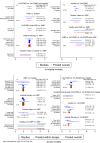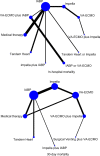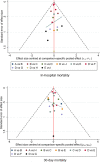Mortality in cardiogenic shock patients receiving mechanical circulatory support: a network meta-analysis
- PMID: 35152887
- PMCID: PMC8842943
- DOI: 10.1186/s12872-022-02493-0
Mortality in cardiogenic shock patients receiving mechanical circulatory support: a network meta-analysis
Abstract
Objective: Mechanical circulatory support (MCS) devices are widely used for cardiogenic shock (CS). This network meta-analysis aims to evaluate which MCS strategy offers advantages.
Methods: A systemic search of PubMed, EMBASE, and the Cochrane Central Register of Controlled Trials was performed. Studies included double-blind, randomized controlled, and observational trials, with 30-day follow-ups. Paired independent researchers conducted the screening, data extraction, quality assessment, and consistency and heterogeneity assessment.
Results: We included 39 studies (1 report). No significant difference in 30-day mortality was noted between venoarterial extracorporeal membrane oxygenation (VA-ECMO) and VA-ECMO plus Impella, Impella, and medical therapy. According to the surface under the cumulative ranking curve, the optimal ranking of the interventions was surgical venting plus VA-ECMO, medical therapy, VA-ECMO plus Impella, intra-aortic balloon pump (IABP), Impella, Tandem Heart, VA-ECMO, and Impella plus IABP. Regarding in-hospital mortality and 30-day mortality, the forest plot showed low heterogeneity. The results of the node-splitting approach showed that direct and indirect comparisons had a relatively high consistency.
Conclusions: IABP more effectively reduce the incidence of 30-day mortality compared with VA-ECMO and Impella for the treatment of CS.
Keywords: Cardiogenic shock; Impella; Intra-aortic balloon pump; Mechanical circulatory support; Tandem heart; Venoarterial extracorporeal membrane oxygenation.
© 2022. The Author(s).
Conflict of interest statement
The authors declare that the research was conducted in the absence of any commercial or financial relationships that could be construed as a potential conflict of interest.
Figures





References
-
- van Diepen S, Katz JN, Albert NM, Henry TD, Jacobs AK, Kapur NK, Kilic A, Menon V, Ohman EM, Sweitzer NK, et al. Contemporary management of cardiogenic shock: a scientific statement from the American Heart Association. Circulation. 2017;136(16):e232–e268. - PubMed
-
- Rihal CS, Naidu SS, Givertz MM, Szeto WY, Burke JA, Kapur NK, Kern M, Garratt KN, Goldstein JA, Dimas V, et al. 2015 SCAI/ACC/HFSA/STS Clinical Expert Consensus Statement on the Use of Percutaneous Mechanical Circulatory Support Devices in Cardiovascular Care: Endorsed by the American Heart Assocation, the Cardiological Society of India, and Sociedad Latino Americana de Cardiologia Intervencion; Affirmation of Value by the Canadian Association of Interventional Cardiology-Association Canadienne de Cardiologie d'intervention. J Am Coll Cardiol. 2015;65(19):e7–e26. - PubMed
-
- Vallabhajosyula S, Dunlay SM, Prasad A, Kashani K, Sakhuja A, Gersh BJ, Jaffe AS, Holmes DR, Jr, Barsness GW. Acute noncardiac organ failure in acute myocardial infarction with cardiogenic shock. J Am Coll Cardiol. 2019;73(14):1781–1791. - PubMed
-
- Vallabhajosyula S, Arora S, Sakhuja A, Lahewala S, Kumar V, Shantha GPS, Egbe AC, Stulak JM, Gersh BJ, Gulati R, et al. Trends, predictors, and outcomes of temporary mechanical circulatory support for postcardiac surgery cardiogenic shock. Am J Cardiol. 2019;123(3):489–497. - PubMed
Publication types
MeSH terms
LinkOut - more resources
Full Text Sources

